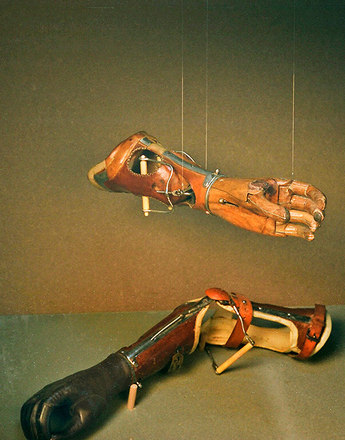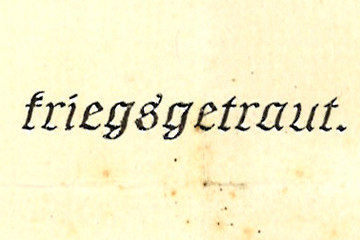The First World War gave rise to a considerable increase in extramarital sexual relations, a matter of great concern to the government and military leadership. They feared a rapid spread of venereal diseases and a weakening of the combat capability of the troops.
IAll of the belligerent countries called on their troops to exercise abstinence. The health advisers in the British military encouraged self-control and abstinence as the most reliable way of preventing venereal diseases. The military doctors in the Canadian Expeditionary Force, who initially instructed the troops on the use of prophylactic aids, started in early 1917 to encourage recruits to be abstinent.
In France a regulation issued in autumn 1916 ordered all troops to attend lectures on the symptoms and dangers of venereal diseases. Military doctors appealed to the soldiers’ sense of honour and the need to protect not only themselves but also their families from disease. It was their duty to father healthy children to safeguard the future of the nation.
Leaflets were distributed in Germany appealing to the soldiers’ sense of duty:
“Every soldier has the sacred duty of staying healthy for the fatherland, doubly and triply so in times of war, when the greatest demands are made of his capacities. Nothing jeopardises the health and efficiency of a soldier more than venereal diseases: syphilis and gonorrhoea. They not only cause great pain but also make the man weak and unable to march or fight, not to mention the severe life-long health damage caused by these diseases.”
“Resist from the outset” was the title of a leaflet issued by the governor of Tyrol and Vorarlberg. It informed the soldiers that “in contrast to a widely held prejudice, most doctors are in agreement that abstinence in sexual relations […] is not damaging to health.”
The prostitution regulation on the south-west front went a step further and appealed to the sense of duty of Austro-Hungarian troops: “As you have taken the war to enemy countries, the women and girls there are also your enemy, who with smiling faces will take away your health and strength. […] If you become infected, you are not only denying the fatherland of your strength but are also betraying your loved ones at home – the home that you will hope to see again!”
The soldiers were urged to remain faithful to their wives and fiancées and warned, with nationalistic slogans, not to have sexual relations with women from enemy countries. The Landesversicherungsanstalt Berlin issued a warning to the troops in 1915 that they should think not only of their own women and children but also of the fatherland itself: “The strength and health of the army is the first prerequisite for the final victory.”
Translation: Nick Somers
Dietrich, Elisabeth: Der andere Tod. Seuchen, Volkskrankheiten und Gesundheitswesen im Ersten Weltkrieg, in: Eisterer, Klaus/Steininger, Rolf (Hrsg.): Tirol und der Erste Weltkrieg, Innsbruck 2011, 255-275
Sauerteig, Lutz: Militär, Medizin und Moral: Sexualität im Ersten Weltkrieg, in: Eckart, Wolfgang U./Gradmann, Christoph (Hrsg.): Die Medizin und der Erste Weltkrieg, 2. Auflage, Herbolzheim 2003, 197-226
Rhoades, Michelle K.: Renegotiating French Masculinity. Medicine and Venereal Disease during the Great War, in: French Historical Studies (2006), 29/2, 293-327
Hirschfeld, Magnus/Gaspar, Andreas: Sittengeschichte des Ersten Weltkrieges, 2. Auflage, Hanau am Main 1966
Quotes:
“Every soldier has ...“: Merkblatt der Gesellschaft zur Bekämpfung der Geschlechtskrankheiten, quoted from: Hirschfeld, Magnus/Gaspar, Andreas: Sittengeschichte des Ersten Weltkrieges, 2. Auflage, Hanau am Main 1966, 174 (Translation)
“Resist from the outset”: „Merkblatt für Männer“ der k. k. Statthalterei für Tirol und Vorarlberg, quoted from: Dietrich, Elisabeth: Der andere Tod. Seuchen, Volkskrankheiten und Gesundheitswesen im Ersten Weltkrieg, in: Eisterer, Klaus/Steininger, Rolf (Hrsg.): Tirol und der Erste Weltkrieg, Innsbruck 2011, 267 (Translation)
„Enthaltsamkeit im geschlechtlichen Verkehr …“: „Merkblatt für Männer“ der k. k. Statthalterei für Tirol und Vorarlberg, quoted from: Dietrich, Elisabeth: Der andere Tod. Seuchen, Volkskrankheiten und Gesundheitswesen im Ersten Weltkrieg, in: Eisterer, Klaus/Steininger, Rolf (Hrsg.): Tirol und der Erste Weltkrieg, Innsbruck 2011, 267 (Translation)
“As you have taken ...“: „Merkblatt für Männer“ der k. k. Statthalterei für Tirol und Vorarlberg, quoted from: Dietrich, Elisabeth: Der andere Tod. Seuchen, Volkskrankheiten und Gesundheitswesen im Ersten Weltkrieg, in: Eisterer, Klaus/Steininger, Rolf (Hrsg.): Tirol und der Erste Weltkrieg, Innsbruck 2011, 268 (Translation)
“The strength and health ...": Mahnruf, quoted from: Sauerteig, Lutz: Militär, Medizin und Moral: Sexualität im Ersten Weltkrieg, in: Eckart, Wolfgang U./Gradmann, Christoph (Hrsg.): Die Medizin und der Erste Weltkrieg, 2. Auflage, Herbolzheim 2003, 208 (Translation)
-
Chapters
- Separation of husbands and wives and sexual mobility in the First World War
- Dwindling birth rates during the First World War
- "Mobilisation of the cradle"
- State control and social stigma
- Abstinence and satisfaction of needs
- Combatting venereal diseases in the Austro-Hungarian army
- “Resist from the outset”
- Sexual relief for soldiers
- Prevention or punishment
- Sexual assault in the First World War
- Sexual violence in Allied war propaganda




